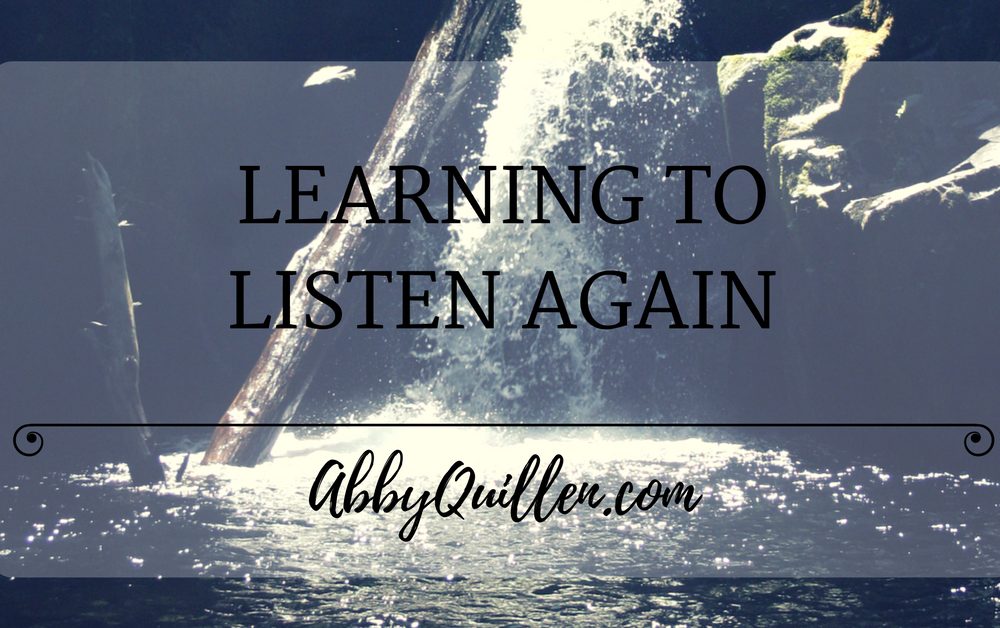The Christian Science Monitor published my essay “Learning to Listen Again” in their January 31 issue. (It was inspired by a post I wrote here last June.)
My world has gotten a lot louder lately. My 2-year-old son, Ezra, just discovered noise.
“Airplane, airplane, airplane.” He gestures toward the sky until I repeat, “Airplane.”
“Car!” He interrupts the story I’m reading and spins toward the window as a Volvo station wagon rolls by. “Phone, phone, phone,” he says as we walk through the grocery store and hear cellphones chirping.
Usually I’m blocking out these sounds. I suppose it’s a survival mechanism that helps me live in a world full of obnoxious, cacophonous noises, because now that Ezra’s pointing them out to me, I’m longing for silence.
I’m not the only one. Gordon Hempton, an acoustic ecologist, travels the world recording natural soundscapes, and he’s been spreading some alarming news: Natural silence is going extinct.
“In the last 30 years, I’ve found it nearly impossible in the United States to experience 15 minutes or longer where there’s not some kind of noise disruption in the background,” Mr. Hempton explained in a recent radio interview.
A couple weeks after Ezra starts identifying sounds, my sister announces she’s coming for a visit and wants to go for a hike. “As long as it’s somewhere quiet,” I reply.
We choose McDowell Creek Falls, which is an hour from my house in Eugene, Ore. We turn off I-5 and head down a country road. The farmhouses thin; the road narrows; Douglas firs, Western hemlocks, and moss-covered big leaf maples crowd in. A stream babbles on our right. I can almost taste the silence.
When Hempton talks about natural silence, he’s not talking about the absence of all sound, just of man-made sound. Natural silence can be surprisingly loud, as anyone who’s been to the Oregon coast, visited a rain forest, or heard an elk bugling on a crisp fall morning can attest.
My sister parks the car and I strap my son onto my back. Then we cross a bridge and wind up a hill. My sister stops to snap photos of salmon berries and snails, and I close my eyes. I can hear a waterfall, birds, and an animal scampering through the undergrowth.
“Big truck!” Ezra squeals, as a logging truck rumbles down a nearby road.
Back in Eugene I surf through real estate websites from the tiny Colorado mountain town where I grew up. When I moved to the city for college, I told someone where I was from, and she replied, “Oh yes, I go there to listen to the silence.” When I temporarily moved back a few years later, I appreciated what she meant. The evenings were notably quiet in my neighborhood. Most of the houses were dark by 9, few cars passed, and it was more than a mile to the closest highway, which wasn’t exactly teeming with traffic most nights.
I start planning a visit with just one thing on the itinerary: sitting outside in the evenings and staring at the stars – just me and the crickets, hoot owls, and the occasional barking dog. I call my parents to announce we’re coming and to lament that I’m thinking of wearing earplugs from now on.
“I thought you left because it was quiet,” my mom says.
“What are you talking about?” I flash back to the last summer I spent in my hometown before leaving for my freshman year at the University of Denver. I longed to crowd onto the trolley and ride up the Sixteenth Street Mall, weave through packed city sidewalks, and shout along to rock concerts at Red Rocks.
“Remember, you used to complain about how dull it is here, how everyone goes to bed at 9, how…” I interrupt my mom, almost letting it slip that sometimes I go to bed at 9 now. Instead, I change the subject and wander around the house closing windows; outside, a diesel truck is idling and a weed wacker is hacking and whining.
Gordon Hempton teaches wilderness listening at Olympic National Park, and he writes that some students have a difficult time hearing silence for the first time and that many sounds aren’t audible until people have been out on the trail for two or three days. He writes about an elderly woman who took one of his classes. She thought she was losing her hearing and hoping to amplify what little she had left. But in the class, she realized that the problem wasn’t that she’d lost her hearing. What she’d lost was her ability to listen. I think Ezra is teaching me the same thing.
“Leaves,” he says as we walk through our neighborhood. He points up. Far above our heads, the birch leaves are dancing in the breeze, and their gentle rattle drowns out the sound of a passing car. I turn my face up and remember to listen.
If you liked this post, you may enjoy these related posts:

